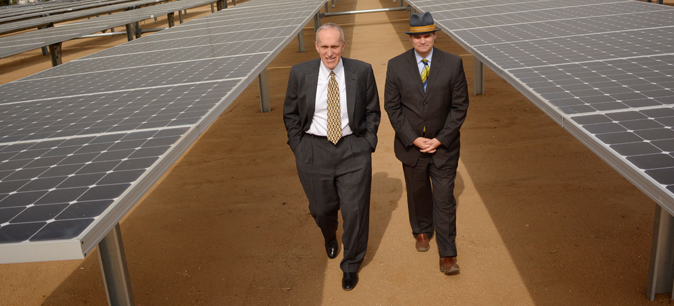UC making big moves toward carbon neutrality

UC Riverside Chancellor Kim Wilcox and John Cook, director of the Office of Sustainability, walk through the solar panels at the ribbon cutting for the UCR solar farm. Carlos Puma photo
The University of California quietly met an important milestone in 2014: It successfully reduced greenhouse gas emissions to the same level as 14 years ago. It also took several major steps toward achieving carbon neutrality by 2025.
First, UC became an electric service provider and wholesale power provider, which will help it choose cleaner power sources for the electricity it buys. As of January 2015, UC is directly supplying power to five campuses, three medical centers and other electricity accounts throughout the system.
Next, UC made the largest solar power purchase of any higher education institution in the country. Once the new solar arrays come online in 2016, about 15 percent of the electricity used by UC will come from the sun.
These actions are crucial to UC’s efforts to ramp up its use of renewable energy sources, a cornerstone for reaching zero-net greenhouse gas emissions from its buildings and vehicles by 2025, the goal of UC President Janet Napolitano’s Carbon Neutrality Initiative.
“Our efforts during 2014 exemplify the University of California’s leadership in sustainability,” said UC Executive Vice President Nathan Brostrom, who is presenting UC’s Annual Report on Sustainable Practices to the Board of Regents at its meeting on Jan. 22. “We made great strides toward carbon neutrality and harnessed the entire university — our students, staff, faculty and researchers — to pursue this daunting challenge.”
The annual report tracks UC’s progress toward achieving carbon neutrality and its advances in nine areas covered by its sustainability policy: green building, clean energy, transportation, climate protection, sustainable operations, waste reduction and recycling, environmentally preferable purchasing, sustainable foodservice and sustainable water systems.
Although carbon neutrality had been a long-term goal of UC’s sustainable practices policy, Napolitano galvanized efforts across the system by setting a 2025 deadline.
For more, follow these links:
- Read Harry Mok’s full story.
- Read the complete annual report on the UC sustainability website.


